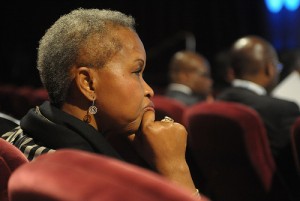CHOGM 2011: "Women as agents of change is a key theme"
October 29

World leaders are in Perth on the west coast of Australia this week to take part in the biennial Commonwealth Heads of Government Meeting (CHOGM).
Women as agents of change is the association’s theme for 2011. Grant Duthie, 18, a Commonwealth Correspondent from the Gold Coast, here recounts some of the key challenges faced by women and girls in the association’s 54 member states.
A major focus of this year’s CHOGM meetings in Perth addresses the need for women empowerment. The theme culminated in the amendment to any future heirs to the throne allowing the first born to take to the throne regardless of gender.
Still as the theme recognizes this year, many women face a difficult battle in almost every countries with gender inequalities. Currently girls are more likely than boys to die from mostly preventable diseases, with families opting to immunize sons over daughters affecting their life expectancy and future outcomes.
With the absence of women in decision making in the development of community and family policy, this has led to often ineffective and unsustainable outcomes that fail to address the root cause of the issue.
Women in rural communities face vicious poverty cycles with no access to education which is necessary to provide opportunities for employment leaving many women to survive through arduous and poor income based subsistence farming.
African women farmers face many labour constraints with their lack of education, meaning they are unable to deal with change or new technologies needed to improve productivity and income generation.
Similarly, due to traditional land tenures in some countries women gain smaller landholdings than men (which are often remote and infertile), all of which leads to the feminization of poverty.
A first step solution to addressing the issue in many circumstances is through improving access to education with primary schooling for women capable of boosting agricultural output by 24 per cent, which would greatly assist in community development.
But as it stands a major hurdle is the need for families to understand the benefits and relevance education is to their daughters. There is a strong need for grassroots curricular that combines local with core content.
A number of factors including HIV/AIDS in Africa as well as men moving away from families to urban centres in search of better employment and income generating activities, have produced a disproportionate number of women-headed households.
As it is often the role of women to take care of ill household members this also adds pressure to their finances, particularly when diseases are more prevalent during important growing seasons.
Many women will also be made vulnerable by climate change through their lack of access to sources of emergency information and involvement in decision making on preparedness programs. Through climate change pressure will be placed on women and impinge on their ability to perform jobs such as water collecting and subsistence farming with many families withdrawing girls from school to compensate.
These actions will hugely undermine the critical role women play in the health and well-being of families, awareness of reproductive health, the social cohesion of communities and the preservation of fields, forests and waterways.
This year’s CHOGM meetings are a milestone with the Head of the Commonwealth Queen Elizabeth II, the Australian Prime Minister Julia Gillard and Prime Minister of Trinidad and Tobago, Kamia Persad-Bissessar taking summit leadership roles. As Commonwealth Secretary-General Kamalesh Sharma acknowledges that through the center stage roles of women leaders this year “we have lived up to [the theme] spectacularly”.
While there are many challenges that lay ahead, recognizing the importance of addressing the undervalued role of women in many countries is a momentous step.
…………………………………………………………………………………………………………………
About me:
“My name’s Grant Duthie and I’m a high-school student on the Gold Coast of Australia. My favourite subject is geography, because it is so relevant and the focus is on conservation and sustainability, which are global issues affecting us all.
“Through my concern for the environment I have been lucky enough to have been given a number of opportunities to work with a number of organisations, such as Polar Bears International, and UN Youth Australia. In the future, I hope to work for the United Nations and make a thorough contribution to these causes.”
…………………………………………………………………………………………………………………
Opinions expressed in this article are those of the author and do not necessarily represent the views of the Commonwealth Youth Programme. Articles are published in a spirit of dialogue, respect and understanding. If you disagree, why not submit a response?
To learn more about becoming a Commonwealth Correspondent please visit: http://www.yourcommonwealth.org/submit-articles/commonwealthcorrespondents/
…………………………………………………………………………………………………………………



